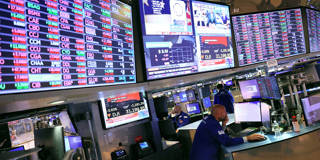While globalization reduced production and labor costs, the current trend toward deglobalization is characterized by high tariffs and geopolitical tensions that threaten to make surging prices a fixture of the global economic landscape. Beating high inflation in the US and elsewhere requires a coordinated global response.
NEW YORK – It is now widely accepted that deglobalization – the retrenchment of global trade, unwinding of capital flows, new barriers to migration, and declining influence of multilateral institutions – is well underway. But policymakers have yet to acknowledge its contribution to global inflation. To rein in surging price growth, the Federal Reserve and other central banks must adjust to the challenges of a rapidly deglobalizing world.

NEW YORK – It is now widely accepted that deglobalization – the retrenchment of global trade, unwinding of capital flows, new barriers to migration, and declining influence of multilateral institutions – is well underway. But policymakers have yet to acknowledge its contribution to global inflation. To rein in surging price growth, the Federal Reserve and other central banks must adjust to the challenges of a rapidly deglobalizing world.